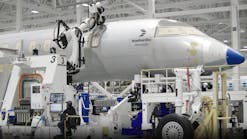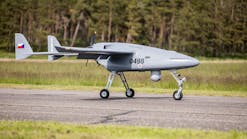At 59, Mark Zenner would like to keep working for a few more years. But because he's a pilot with a major U.S. airline, the Denver resident will be forced to retire when he turns 60 in May.
The Federal Aviation Administration requires all U.S. pilots to stop flying large commercial passenger planes at age 60.
With pensions disappearing, better health at older ages and the baby boom generation flexing its muscle, some pilots are pushing for a change.
Zenner and other pilots want to change the Age 60 rule, which the Air Line Pilots Association describes as "one of the most historically contentious issues among the pilot community."
The rule "is antiquated, ossified and was never based on medical science," said Zenner. "For me personally, there's a huge economic motivation behind this."
His pension benefits were reduced 75 to 80 percent after his airline terminated its pension plan. Now his youngest daughter has been accepted to medical school.
"I would dearly like to help her out with that," Zenner said.
With nearly 69 percent of pilots in the Air Line Pilots Association between the ages of 41 and 60, debate over the mandatory retirement age is bound to heat up.
"Sixty is just a number that's really picked out of the air," said Frank McCurdy, a 65-year-old retired United Airlines pilot. "It's basically not fair."
Congress is considering legislation that would raise the maximum age to 65, and the Federal Aviation Administration is reviewing its policy.
Opposition to the change is strongest among pilots whose pensions remain intact and younger pilots eager to work into the best-paying jobs.
If fewer pilots retire, gaining seniority and moving up the ranks will take longer. And that "translates to earnings, quality of life and schedule," said Greg Mateyko.
He has been flying for a major national airline for about 10 years and would like more opportunity to fly the best routes with the most appealing schedules.
Support for the change often comes from older pilots, those whose airlines don't have pension plans and those whose pensions have been reduced.
"Their lifestyle is dependent upon the pay they were getting and the anticipated retirement money they were going to get, and that all went by the wayside," said Bert Yetman. He is president of the Professional Pilots Federation, a group formed in 1991 to eliminate or change the Age 60 rule.
"Now they've still got house payments to make, kids going to college. Suddenly ? they're having to sell their houses, change their lifestyle."
Guy Casey of Castle Rock, 67, retired from United Airlines and now works for NetJets as a corporate aircraft pilot. He's among the retirees who would have enjoyed the opportunity to work for a major airline a few more years.
"They're kind of forced like I was to leave the airline and go out looking for other work," he said.
Pilot groups have been lobbying Congress for almost a decade to raise the age limit. They say the nearly 50-year-old rule was based on politics rather than science.
Yet as recently as 2005, FAA air surgeon Jon Jordan defended the rule when he testified before Congress. He said it "represents (our) best determination of the time when a general decline in health-related functions and overall cognitive and performance capabilities may begin ? and therefore jeopardize safety."
Cardiovascular disease rises with age, beginning between ages 55 and 65, Jordan testified, as does a decline in sensory and motor capabilities.
The issue is complicated by varying opinions in the medical community.
Aerospace Medical Association executive director Russell Rayman testified that in countries that permit air transport pilots to continue flying beyond age 60, "to our knowledge, there has been no adverse effect upon safety" and there is "no clear answer" to whether aging causes significant performance declines in the cockpit.
Gary Cottingham, a pilot and director of legislative affairs for Airline Pilots Against Age Discrimination, said his organization believes the current twice-a-year medical checks and flight simulator checks are adequate.
"This particular rule is arbitrary, discriminatory, and it needlessly throws out experienced pilots," said Southwest Airline Pilots Association president Joseph "Ike" Eichelkraut.
To Michael Ballard, a United pilot who lives in Larkspur, "it just seems a shame to draw the line based strictly on age. (At 59), I'm probably experience-wise and ability-wise as good as I've ever been."
The Allied Pilots Association points to safety issues as the reason it supports the Age 60 rule.
"How can you take a chance on a trial with the American public?" said Denny Breslin, an American Airlines pilot who serves as the association's spokesman. The rule has worked for decades, and no airline crash has ever been attributed to an age-related problem, he said.
Since 1980, the nation's largest pilots union - the Air Line Pilots Association - also has supported it.
"This rule should be changed only if we can guarantee - beyond all reasonable doubt - that any change will have a positive effect on air safety," president Duane Woerth told Congress last year. Woerth's term ends this year, however, and some think the newly elected leader, John Prater, may reconsider the policy.
A survey released in 2005 found that 56 percent of the group's members support maintaining the current rule while 42 percent want it changed. That finding may reflect the union's membership, which has more younger pilots than those 50 or over, said Kirk Reinhardt, a United pilot and former Denver council chairman for United's pilots association.
While Frontier and United Airlines do not have a position on the rule, Southwest Airlines backs a change to raise the retirement age.
"We just feel that forcing our most experienced pilots to retire because of a rule that as far as we know is not based on any data or medical history is just unfair," said Southwest spokeswoman Paula Berg.
At Southwest Airlines, which doesn't have a pension plan, pilots are 4 to 1 in favor of changing the rule, according to Eichelkraut.
"The division right now is between those individuals who would like to have a fulfilling, complete, productive career versus those who have a defined benefit pension plan who don't see any gain" from extending the retirement age, Eichelkraut said.
The FAA has been studying the issue since September, but its forum of experts recently reported that it had reached no conclusion, according to Bloomberg News.
Legislation now in Congress would, if passed, direct the FAA to raise the mandatory retirement age to 65. Doing so would match a policy instituted Nov. 23 by the International Civil Aviation Organization, a U.N. group that sets basic security standards for civil aviation worldwide.
Copyright 2005 LexisNexis, a division of Reed Elsevier Inc. All rights reserved.
Terms and Conditions | Privacy Policy
News stories provided by third parties are not edited by "Site Publication" staff. For suggestions and comments, please click the Contact link at the bottom of this page.





